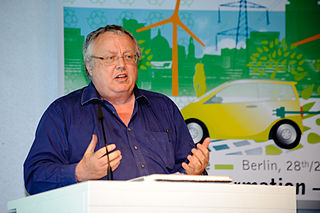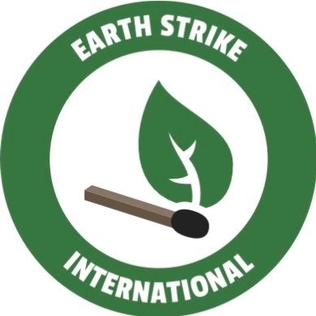Related Research Articles

Friends of the Earth International (FoEI) is an international network of grassroots environmental organizations in 73 countries. About half of the member groups call themselves "Friends of the Earth" in their own languages; the others use other names. The organization was founded in 1969 in San Francisco by David Brower, Donald Aitken and Gary Soucie after Brower's split with the Sierra Club because of the latter's positive approach to nuclear energy. The founding donation of $500,000 was provided by Robert Orville Anderson, the owner of Atlantic Richfield oil company. It became an international network of organizations in 1971 with a meeting of representatives from four countries: U.S., Sweden, the UK and France.

The environmental movement, is a social movement that aims to protect the natural world from harmful environmental practices in order to create sustainable living. Environmentalists advocate the just and sustainable management of resources and stewardship of the environment through changes in public policy and individual behavior. In its recognition of humanity as a participant in ecosystems, the movement is centered on ecology, health, as well as human rights.
The following outline is provided as an overview and topical guide to green politics:
Friends of the Earth England, Wales and Northern Ireland is one of 75 national groups around the world which make up the Friends of the Earth network of environmental organisations. It is usually referred to as just 'Friends of the Earth' within its home countries.

The Australian Conservation Foundation (ACF) is Australia's national environmental organisation, launched in 1965 in response to a proposal by the World Wide Fund for Nature for a more co-ordinated approach to sustainability.
The Australian Student Environment Network (ASEN) is the national network of many campus environment collectives in Australia, formed at the 1997 Students and Sustainability convergence in Townsville. People from ASEN facilitate communication between environment collectives and co-ordinate national projects and campaigns. ASEN is particularly known for cultivating intersectional social justice analyses and critiques amongst young environmentalists, facilitating direct action campaigns, projects towards just transitions and indigenous solidarity work. ASEN is the longest running, and one of the largest, youth environment networks in Australia.

Environmental planning is the process of facilitating decision making to carry out land development with the consideration given to the natural environment, social, political, economic and governance factors and provides a holistic framework to achieve sustainable outcomes. A major goal of environmental planning is to create sustainable communities, which aim to conserve and protect undeveloped land.
Friends of the Earth U.S. is a non-governmental environmental organization headquartered in Washington, D.C., founded in 1969 by environmentalist David Brower. Friends of the Earth U.S. campaigns on issues including climate change, pollution, nuclear technology, genetic engineering, deforestation, pesticides, food and agriculture and economic policy. It is a founding member of Friends of the Earth International.
Moviment għall-Ambjent, Friends of the Earth Malta, formerly known as Żgħażagħ għall-Ambjent, is a committee of environmental activists in Malta. The group was first set up as an umbrella organisation for various youth and environmental groups but soon developed into its present form.
The Korea Federation for Environmental Movements (KFEM) is a non-profit organization in South Korea that focuses on environmentalism.
Green jobs are, according to the United Nations Environment Program, "work in agricultural, manufacturing, research and development (R&D), administrative, and service activities that contribute(s) substantially to preserving or restoring environmental quality. Specifically, but not exclusively, this includes jobs that help to protect ecosystems and biodiversity; reduce energy, materials, and water consumption through high efficiency strategies; de-carbonize the economy; and minimize or altogether avoid generation of all forms of waste and pollution." The environmental sector has the dual benefit of mitigating environmental challenges as well as helping economic growth.

Nuclear weapons testing, uranium mining and export, and nuclear power have often been the subject of public debate in Australia, and the anti-nuclear movement in Australia has a long history. Its origins date back to the 1972–1973 debate over French nuclear testing in the Pacific and the 1976–1977 debate about uranium mining in Australia.

Tom Burke CBE is a co-founder of E3G, Third Generation Environmentalism and currently chairs its Board. He is also a visiting Honorary Professor of Imperial and University Colleges, London and a Senior Associate of Cambridge Institute for Sustainability Leadership (CISL). He has a long track record of experience with international environmental organisations working with and for both non-governmental and official bodies.

Beginning as a conservation movement, the environmental movement in Australia was the first in the world to become a political movement. Australia is home to United Tasmania Group, the world's first green party.
The Transition Decade is a non-partisan shared campaign which is coordinated by an alliance of Australian community, social, and environmental groups, non-profits and NGOs. The initiative forms a unified plan to campaign, lobby and work to restore safe climate conditions and a sustainable future.
Friends of the Earth Europe (FoEE) is the European branch of the world's largest grassroots environmental network, Friends of the Earth International (FOEI). It includes 33 national organizations and thousands of local groups.
The following outline is provided as an overview of and topical guide to environmentalism:

Friends of the Earth – France is an association for the protection of people and the environment. It is one of 76 national groups around the world which make up the Friends of the Earth network of environmental organizations. The group is listed as an association under the French law of 1901 (Loi de 1901) and authorised to act for the protection of the environment in France by order of the Environment Minister. Friends of the Earth – France is independent of any economic, political and religious influences.

Earth Strike is an international grassroots movement that called for a global general strike for climate action. Their aim was a global general strike lasting from 20 until 27 September 2019. The movement has had public support from organizations including Extinction Rebellion and Fridays for Future, as well as public figures including Noam Chomsky. The Earth Strikes were part of the worldwide September 2019 climate strikes, which gathered millions of protesters.
References
- ↑ Peter Hayes, March 2015, Founding Friends of the Earth Australia: the Early Years , Friends of the Earth Australia History Blog. Retrieved 7 April 2015
- ↑ 3CR (10 January 2020). "Acting Up! Podcasts on 45 Years of Friends of the Earth". The Commons Social Change Library. Retrieved 23 October 2023.
{{cite web}}: CS1 maint: numeric names: authors list (link) - ↑ Walker, Cam (26 August 2019). "30 years of creative resistance". The Commons Social Change Library. Retrieved 23 October 2023.
- ↑ "National Campaigns and Projects". Friends of the Earth Australia. Retrieved 21 September 2010.
- ↑ Rooney, Millie (1 June 2022). "'Always look up': Connecting Community for a Win against Gas". The Commons Social Change Library. Retrieved 23 October 2023.
- ↑ Gibbard, Sam (2020). "ACE Anti-Nuclear Activist Archive". doi:10.6084/m9.figshare.11497125.
- ↑ "Nanotechnology Project". Friends of the Earth Australia. Retrieved 21 September 2010.
- ↑ "Food Co-op". Friends of the Earth Melbourne. Retrieved 21 September 2010.
- ↑ "Our Funding". Friends of the Earth Australia. Archived from the original on 26 February 2011. Retrieved 21 September 2010.
- ↑ Bolt, Andrew (19 June 2008). "Age drowns in green myths". The Courier-Mail . Archived from the original on 6 October 2011. Retrieved 21 September 2010.
- ↑ "A critique of the FoE Environment and population position paper (Clive Hamilton)". Friends of the Earth Australia. Archived from the original on 15 December 2010. Retrieved 21 September 2010.
